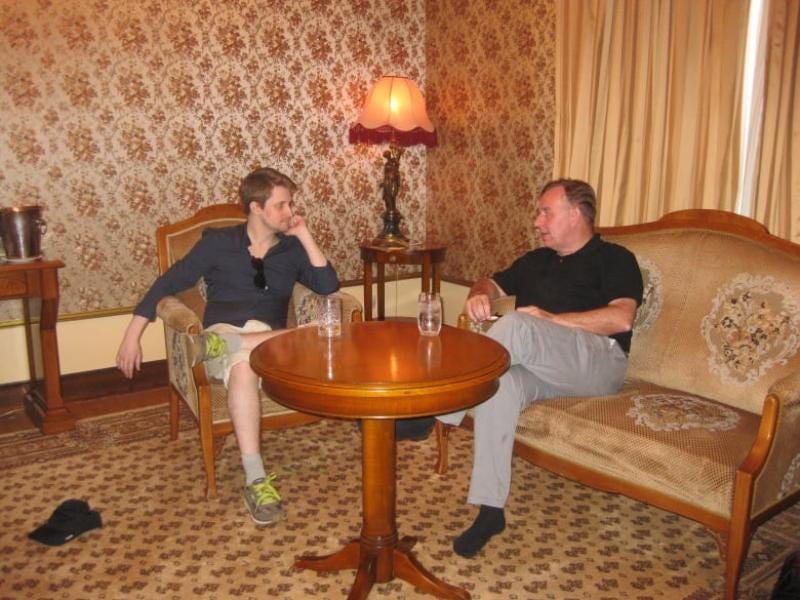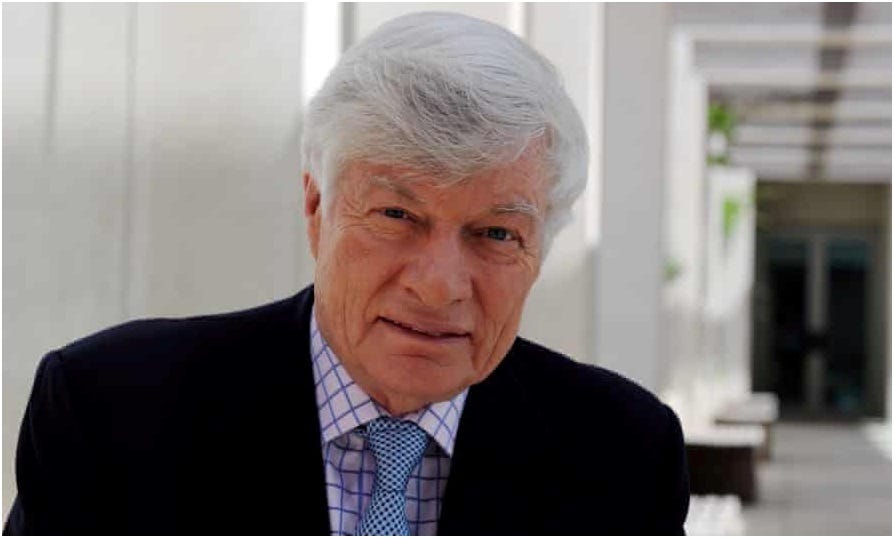[ad_1]

Eight years after he provided assistance to refugees who helped former CIA contractor Edward Snowden escape to Ecuador but who ended up stranded in Russia, human rights lawyer Robert Tibbo remains a target of a vengeful Hong Kong Bar Council, he says, which is seeking disciplinary action against him although he has long since decamped to his home country Canada.
In its most recent action, a Hong Kong high court has held its first hearing to hear the application for Tibbo (above, right, with Snowden) to be represented by Geoffrey R. Robertson, a Queen’s Counsel who is arguably the UK’s most famous – if not most glamorous – human rights barrister, academic, media figure and author. The Bar Council has remained neutral. The Department of Justice opposes Robertson’s application. He is acting free of charge.
Given the current political situation in Hong Kong, with the government in Beijing showing no interest in any kind of human rights legal gambits, it is difficult to imagine the Hong Kong courts are going to look with any favorability toward granting leave for Robertson to represent Tibbo, or anybody else. The idea allowing one of the world’s most important human rights counsels a major stage on which to make any pronouncements is probably a non-starter.

“The Bar Association has in effect stepped aside to allow the Department of Justice to make efforts to bar Robertson from acting for me in these proceedings,” Tibbo said. “Had the bar consented to the application, Robertson would have been admitted without any court hearing or opposition from the Department of Justice. This is an example of the apparent loss of independence of the Bar.”
The clients that Tibbo has acted for since 2012 in Hong Kong and facilitated filing of their refugee claims in Canada after they provided aid to Snowden – Sri Lankans Supun Kellapatha and his wife, Nadeeka Nonis and their two children and a fifth, Ajith Pushpa Kumara, an ex-soldier who is also seeking asylum – remain in limbo. Canada is still processing their refugee cases, though two of Tibbo’s other clients, Vanessa Rodel and her daughter, who also helped Snowden, have since been given refuge in Montreal.
The seven sheltered Snowden from detection in 2013 after he flew to Hong Kong from the US after copying and leaking to selected reporters a huge trove of National Security Agency (NSA) classified information, revealing numerous global surveillance programs run with the cooperation of domestic telecoms companies and European governments in contravention of the Fourth Amendment to the US Constitution. His disclosures went further by exposing the NSA and Fives Eyes group global electronic mass surveillance on every country in the world covering civilian populations, corporations, and governments.
Snowden’s disclosures forced the US government to tighten its surveillance procedures and started a national discussion of US surveillance secrecy. For his troubles, he remains in Russia as a permanent resident, arguably one of the world’s most-wanted fugitives, and he and his pregnant wife have now applied for Russian citizenship.
Tibbo says he was forced to flee Hong Kong in November 2017 with the help of officers from the Canadian consulate, who escorted him onto the plane, and witnessed by lawyers from Lawyers Without Borders Canada, ahead of arrest on unspecified charges. He has since relocated to Quebec, where he has been once again accredited as a human rights lawyer although he is seeking to retain his ability to practice law before the Hong Kong Bar. He currently represents the remaining Snowden refugees in Hong Kong as well as in their refugee cases in Canada.
“I have maintained my membership in the Bar, I have continued to fight for my clients,” he said in a telephone interview from Canada. “I have asked for more time. I have been asked for disclosure of all evidence relating to the Snowden case from the Bar Council and I have not received it.”
“I am not prepared to be investigated and judged by barristers who have reacted to anonymous complaints from the bar membership against me. These barristers are also the Adjudicators on the Bar Disciplinary Tribunal and cannot be excluded from the group of anonymous complainants.”
Ultimately Tibbo said, “This is an attack on my clients, the Snowden Refugees’ right to choice of counsel. It is apparent that the Bar Association is making every effort to make my clients and me pay a price for our association with Edward Snowden.” A conviction, he said, would serve as a deterrent to all barristers in Hong Kong of forceful advocacy in the territory’s courts. Furthermore, a supposed independent legal profession in Hong Kong, will have to stand up to judges under pressure from Beijing’s new security laws.
In a telephone interview, Tibbo charged that a vengeful Bar Council has continued to harass him – possibly at the behest of the US government or other governments – since 2016 with a series of petty charges including being rude to a prosecutor because of his efforts to help Snowden elude extraordinary rendition (arbitrary arrest, arbitrary detention, enforced disappearance, ill-treatment, torture, and extrajudicial killing).
Among other shortcomings, he is accused of breaching the bar council’s code of conduct, the anonymous bar membership accusing him of putting his clients at risk in a bid to make money, an accusation Tibbo disputes. “I was acting for them on a pro bono basis,” he said. “There was no money in this for me.” Tibbo said he has been denied access to the evidence against him or the identities of the large groups of lawyers accusers who filed the anonymous complaints.
“I was told I pissed off a prosecutor,” Tibbo said. “I didn’t know where I was in the case, I didn’t even know what the evidence was. Five years after the incident, in 2017, the Bar Council said we will prosecute you for being impolite.”
Tibbo now faces 11 separate complaints filed last January before the Barristers Disciplinary Tribunal in Hong Kong, many of them for alleging his failure to reply and one for missing a disciplinary meeting. One, in particular, was his failure to answer the anonymous complaints.
The two anonymous complaints were filed the day director Oliver Stone’s biofilm “Snowden” premiered at the Toronto International Film Festival at which Tibbo was present with Stone and actor Joseph Gordon-Levitt. The film made the former defense contractor a heroic figure. The bar council concealed the actual complaint documents from Tibbo for almost a year despite taking action against him in the 2017 disciplinary action. Thus Tibbo was unaware that the 2017 tribunal members were either included in the anonymous complainants or at a minimum could not be excluded.
Tibbo originally settled in Hong Kong in 1990 as a management consultant. He went to law school and was subsequently called to the bar in 2005, specializing in representing human rights and asylum cases, which is problematic at the best of times.
Critics say the territory has amassed a deplorable record on both. In a paper written for the Pacific Basin Law Journal, James R. Rice, Jr. wrote that “The status of asylum seekers has always been a matter of concern as Hong Kong has never been a signatory to the 1951 United Nations Convention Relating to the Status of Refugees. Additionally, recent court decisions regarding the question of non-refoulment and the absence of a government screening process for refugees make it increasingly difficult for observers to accept Hong Kong as a forward-looking, world-class city.”
“The Bar is a closed circle of people who consider themselves to be elite,” Tibbo said. ”If you want to go deeper, they think I upset the applecart. You’re not supposed to be a junior counsel grabbing headlines. That incensed them. It all stemmed from these anonymous complaints. They have proceeded through the lens of racial discrimination (against him), of political opinion all related to my representation of Snowden.” As he wrote to the Bar Council in December 2017, the “complaint and investigation is predicated upon prejudice rather than reason and concealment in place of disclosure”.
“It is disgraceful conduct on the part of the Bar,” he says. “Why are they going against a guy who is fighting for freedom of expression? The other aspect of it is (if he is faced with disciplinary action) why should the refugees who helped Snowden be denied their choice of counsel? Why is the Hong Kong Bar interfering with my ability to practice law and in particular at this time of the new National Security law, a new draconian Immigration bill slated to be enacted into legislation and all during the Covid-19 pandemic?”
“My clients are caught in an authoritarian system, living in fear under Beijing’s massive intervention in Hong Kong. Beijing has interfered with all branches of government by utilizing the overarching and ambiguous National Security Law to strip away human rights including, due process rights, to silence society. This chilling effect has extended to increasingly silence the legal community.”
The High Court has adjourned the case to 16 June 2021 and has directed the DOJ to indicate within three weeks whether or not they will maintain their position opposing Robertson admission to the Hong Kong Bar.
[ad_2]
Source link